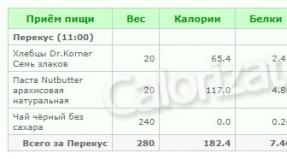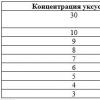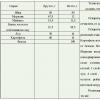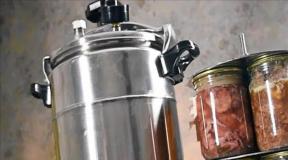Who can sell alcohol. Sale of alcohol
The retail sale of alcoholic beverages is undoubtedly an extremely profitable business. But every year, when carrying out this type of entrepreneurial activity, businessmen are “driven” into an ever more rigid framework: so, from this year, in addition to obtaining special state licenses, new rules for the sale of alcoholic beverages are in force. Read more about this in our material.
Trade in alcohol without connecting to the Unified State Automated Information System is prohibited
In 2016, the main and truly "sensational" innovation in the field of retail sales was the introduction Unified State Automated Information System (EGAIS)... Without fail, all enterprises engaged in the production, retail and wholesale of alcoholic beverages are now connected to the Unified State Automated Information System and send data on alcohol sales to the Federal Service of Rosalkogolregulirovanie.
Simply put, EGAIS is an all-Russian database containing complete information about all alcoholic beverages produced in Russia or imported into the territory of our country. The data on each bottle of alcohol - by whom and when it was produced, what is the composition of the drink, strength and volume - can be found by simply reading the QR code on the smartphone app.

The need for this system is due to the growing volume of counterfeit and fake alcoholic beverages, as well as the increasing incidence of poisoning by low-quality alcohol. .
Organizations that have not connected to the Unified State Automated Information System or that have violated the procedure for recording information are fined: for company managers, the fine will be up to 15 thousand rubles, for legal entities - up to two hundred thousand rubles.
In general, all experts and retailers note the complexity of the rules according to which alcohol should be sold.

Alcoholic products are food products produced either with the use of ethyl alcohol from food raw materials, or without ethyl alcohol, or when using alcohol-containing food products. In this case, the volume fraction of ethyl alcohol should be more than 0.5% of the volume.
There are different types of alcoholic beverages. For example, these are alcoholic drinks (cognac, vodka, whiskey), wine, liqueur, sparkling or fruit wine, beer, cider, mead and others. We all know that the sale of alcoholic beverages is really a profitable business, and that is why the processes of production, trade and consumption of alcohol are strictly controlled and regulated by the state of our country.
Useful documents to download
The main document in this regard is the Federal Law of 22.11.1995 No. 171-F “On state regulation of the production and circulation of ethyl alcohol, alcoholic and alcohol-containing products and on the limitation of consumption (drinking) of alcoholic products”, which often undergoes changes.
According to him, every entrepreneur who wants to be engaged in the manufacture, storage, supply or sale of alcoholic or alcohol-containing products must obtain a license to carry out this type of activity. The sale of alcoholic beverages is subject to mandatory control by authorized state bodies.
Alcohol license: requirements for the outlet

There are a number of requirements that must be met when trading in alcohol:
- Retail sale of alcohol (including beer) is allowed in our country to organizations - LLC, OJSC, CJSC. Individual entrepreneurs can only trade in beer and beer drinks. The license is also issued to individual agricultural producers who sell wines and champagne of their own production.
- Retail sale of alcoholic beverages is prohibited in retail and wholesale markets, railway stations, airports, children's, educational and medical institutions, sports facilities, and cultural organizations. It is not allowed to sell alcohol in public transport, gas stations, bus stops, non-stationary shopping facilities and other places.
- Sale of alcoholic beverages is prohibited to minors. Violation of this law may result in administrative or, in the worst case, criminal liability.
- It must be remembered that advertising of alcoholic beverages on the Internet and on television is prohibited in our country.
- According to the law, retail sale of alcohol is not allowed in a store or outlet without accompanying documents, certificates of conformity, labeling, etc.
- In Russia, the sale of alcohol is prohibited from 23:00 - 8:00 local time (except for catering and duty-free shops).
In addition, there are a number of basic requirements for stores in which it is planned to sell alcoholic beverages in order for them to obtain a license:
- it must be a legal entity;
- it is obligatory to have a stationary trade and warehouse space (with an area of \u200b\u200b50 sq.m. for cities and at least 25 sq.m. in rural settlements), as well as an alarm in a store and a warehouse, cash registers and safes for storing money and documents.
- an enterprise for the sale of alcoholic and alcohol-containing products should not be located closer than 100 meters to children's, educational, medical institutions and sports facilities.
It must be said that the last three requirements are not mandatory for catering establishments.
At the same time, those who wish to carry out the sale of alcoholic beverages must, without fail, equip points of sale with cash registers and maintain strict accountability documents. It is also necessary to properly store alcohol, and comply with fire safety and sanitary and hygienic standards.

Alcohol trading license: how to get
In accordance with the federal law of our country, a license to trade in alcohol is issued only to legal entities. Individual entrepreneurs can only sell beer and beer drinks - this type of product is not subject to licensing. You can get a license for alcohol for one year or for five years at once.
First of all, even before submitting documents for obtaining a license to trade in alcohol, it is necessary to draw up a state duty, which today is 65,000 rubles for each year of the license. That is, the cost of a license for five years will be 325 thousand rubles.
Many businessmen note the difficulty of obtaining a license for the sale of alcoholic beverages precisely in terms of collecting documents. You need to collect a solid package of references and certificates, which includes:
- license application
- notarized copies of constituent documents
- a copy of the document on state registration of an organization - a legal entity.
- a copy of the document on the registration of the organization with the tax authority., an extract from the Unified State Register of Legal Entities, bank details of the organization,
- a certificate from the tax office that the company has no debts in taxes and fees,
- a certificate that confirms the compliance of the trade object with the declared type of activity
- a copy of the document confirming the payment of the state fee for the license.
- conclusions of executive authorities on the compliance of production and storage facilities of the organization with fire safety and environmental requirements
- copies of certificates of conformity and (or) declarations of conformity of the main technological equipment.
- a document confirming that the organization has an authorized capital
- documents confirming that the organization has production and warehouse premises owned or leased for a period of one year or more.
These documents for obtaining a license to trade in alcoholic beverages can be submitted both in paper and in electronic form.

There are also a number of requirements for the size of the authorized capital for organizations planning to sell alcoholic beverages. So, for example, in the amount of ten thousand rubles should be the authorized capital of a company that plans to sell products containing 15% ethanol.
When selling alcoholic beverages with more than 15% ethanol, the authorized capital of the organization must be 300 thousand rubles. If a small business organization sells alcoholic beverages with an ethanol content of more than 15% and the enterprise is not listed in a special register, then the authorized capital of the legal entity should be 1 million rubles. For wholesalers - 10 million rubles.
A license to trade in alcohol is issued within 30 calendar days. In each subject of our country, a license for alcohol is issued by the executive authorities. Which ones - it is necessary to clarify directly in each region. So, for example, in Moscow - these functions are carried out by the Department of Trade and Services.
It is worth considering the following aspect: after you have been collecting documentation for obtaining a license to trade in alcohol for several months, you may face a refusal to issue it. That is, no one will return the state duty in the amount of 65 thousand rubles.
It is also worth remembering that you can renew an "alcoholic" license three months before its expiration date. Until a new license is obtained, the sale of alcohol in the store is prohibited. If you have all the necessary documents, you will easily get a license for alcohol. And observing these rules for the retail sale of alcoholic beverages, the activities of your store will never arouse criticism from the regulatory authorities.

Responsibility for the sale of alcoholic beverages without an appropriate license was tightened by Federal Law N 365-FZ. An entrepreneur will have to pay a fine in the amount of 10 to 15 thousand rubles, and an organization - from 200 to 300 thousand rubles. Moreover, all types of products sold can be confiscated.
Violations and gross violations of licensing requirements can also entail administrative liability and confiscation of alcoholic beverages. This, for example, if a shopping facility does not meet licensing requirements. In case of gross violations of the licensing rules, for example, the sale of poor quality alcohol, the work of your store can be stopped for up to three months.
Also, an organization selling alcohol can be fined up to 300 thousand rubles in case of selling alcoholic products with fake brands - all alcohol except beer is subject to mandatory labeling. The entire consignment of unmarked alcohol will be confiscated.
How to Succeed in the Alcohol Market? It is necessary to arm yourself with an up-to-date source that will provide information: what is the law on alcohol, its nuances and innovations.
The law on the sale of alcoholic beverages is periodically amended in order to improve the quality of alcoholic beverages that customers purchase, to make the supply of low-quality alcohol unacceptable. The latest adjustments to the rules for the sale of alcoholic beverages were added at the beginning of 2017.
Alcohol sales rules
The profitability of the sale of alcoholic beverages is explained by its demand, which never falls. Consumers consume alcoholic beverages. Regardless of factors such as inflation or crisis. In the alcoholic beverages market, each participant in this business receives its share as an entrepreneur and a seller. Therefore, such activities have been profitable at all times, and often they were carried out on illegal grounds.
Illegal trade in such a product is the main reason why all issues related to alcoholic products are controlled by the state at the highest level. For those who choose a business in this area, you must purchase a license. You can buy it by submitting documents that the relevant service will require, it also decides whether the entrepreneur will receive a license to sell alcohol-containing products or not.
List of documents that are required to obtain a permit for the sale of an alcoholic product:
- characteristics of the products that will be licensed;
- certificates of registration of the cash register;
- official permission from the authorities;
- contact information, details;
- a document confirming the payment of the authorized capital;
- company charter.
Regional rules for trade in alcoholic beverages
Legislative conditions for production warehouses and property premises:
- the area of \u200b\u200bthe area in the village must correspond to 25 sq. m;
- the area of \u200b\u200bthe area in the city should be from 50 sq.m .;
- conclusion of a lease for a period of at least 1 year.
The point of the time frame contains its own characteristics: in Moscow, the mode of selling an alcoholic product from 8.00 to 23.00 is allowed, and in the Moscow region, the sales policy is more limited by the schedule from 11:00 to 21:00. In St. Petersburg, the opportunity to purchase alcohol is extended until 22:00. The sales schedule for the Novosibirsk region is from 9:00 to 22:00.
The seller's responsibilities are to assess the appearance of the product, check the condition of the container, the product description, information about the supplier and the manufacturer's brand.
The personnel involved in the sale of alcoholic goods, namely the bartender, waiter, seller or barmaid, must work in appropriate conditions:
- a room equipped with the necessary equipment;
- availability of accessories for customer service;
- utensils for measuring the provided alcohol.
The sale of goods is carried out using the cashier, which provides the buyer with a receipt confirming the payment for the purchase. If the seller violates the procedure for the sale of an alcoholic product, then he is liable for violation of the rules of the retail sale and purchase agreement.
Where to distribute alcoholic beverages
There are places where it is prohibited by Federal Law to sell alcohol:
- institutions and institutions of a children's, sports, medical, educational and cultural nature;
- in military territories;
- in non-stationary types of trade zones;
- public urban or suburban transport, stops on its route, metro stations, gas stations;
- in airports, areas of mass presence of people and increased insecurity, train stations, places of wholesale or retail trade.
In addition to the above points, the territories adjacent to these objects are also taken into account. The exceptions are bars, shopping areas that sell these products around the clock, as well as cafes.
Alcoholic Beverages Act
There is a list of prohibitions established by law, the essence of which is to prohibit:
- Promotion of printed alcoholic products, strong alcoholic products on the Internet;
- Increase the cheapest price of vodka by more than 40%;
- Distribute any alcoholic product without an inscription about its harm to the health of the buyer;
- Drinking alcohol in legal and illegal places;
- Purchase of beer after 12 pm containing more than 5% ABV.
The label of an alcoholic product must comply with the following rules: place of preparation, shelf life, date of bottling, volume of the purchased product, its nutritional value, contraindications to the use of this type of product, a list of ingredients used to prepare this drink, if the product is genetically modified, then there must be the corresponding sticker.
The product is designed as follows: a sample is put on the showcase, which is available, information about the cost, the name of the product is attached to it. Products such as wine, cider, beer can be sold on the bottle, in which case it is necessary to indicate the name and cost of the drink in the volume of 1 liter and 100 g.
What is the fine you can get
If the laws are violated in the alcohol market, the violator will be fined. The arrival of new rules for the sale of alcohol is driving entrepreneurs who run small businesses into a rigid framework.
What fines await someone who violates the rules of alcohol trade:
- Confiscation of alcoholic beverages in the absence of a license, as well as a fine from 10,000 to 15,000 rubles for those who are engaged in entrepreneurial activities, for organizations from 200,000 to 300,000 rubles.
- Confiscation of a batch of a forged brand of alcoholic product, the appointment of an appropriate examination and a fine for the seller 4,000 -5,000 rubles, the entrepreneur 10,000-15,000 rubles, and for organizations 200,000-300,00 rubles in case of detection of a falsified product brand.
- An entrepreneur is obliged to pay a fine of 5,000 - 10,000 rubles, for an organization this amount increases several times: 50,000 - 100,000 rubles if invalid data is provided in the declaration in the field of retail sale of alcoholic goods.
- The store director pays a fine of 5,000 - 8,000 rubles in case of violations of the rules of the state body that deals with the issue of retail sale of alcoholic products. In case of refusal to pay the fine, the amount increases from 6,000 to 12,000 rubles.
Having studied all the nuances of this law in this article, the entrepreneur will become more understandable what needs to be done for his business, so as not to be fined and to continue his activities further.
With each new year, certain changes are made to all sectors of the economic sector, the sale of alcoholic beverages is also no exception, and will appear. First, let's try to understand the term EGAIS, which is not familiar to everyone. EGAIS is short for a unified state automated information system. Why such a system is needed and how it is used, we will consider in our article.
The information system is focused on organizing state control over the production and sale of alcoholic beverages throughout our country. The basis for its development was the fact that according to statistics, approximately thirty percent of all alcohol produced in the country is produced illegally. If we transfer statistical data to a real situation - when entering an alcoholic goods store, every third of those. what you see on the window is illegal.
This situation necessitates introduce new rules for the trade in alcoholaimed at reducing the turnover of sales of illegal alcohol. For entrepreneurs whose activities are related to the sale of alcoholic beverages, this is another stress, because all innovations bring with them certain costs and changes in the established rhythm of work. Next, we will try to answer all the questions that alcohol sellers might have, as well as consider in more detail the essence and principle of operation, as well as connecting to the EGIAS, the timing of when it is necessary to connect to the system and what is required for this. In fact, the introduction of such a control method will not necessarily complicate the work of the business, and for some, on the contrary, it will make it easier.
The main condition for all entrepreneurs who own any retail outlets selling alcoholic beverages at retail is the provision of all information to the information system. Every purchase a business owner makes should be accounted for, even if you only sell beer drinks in your store or cafe.
Six months later, the new rules for alcohol trade will affect not only information on purchases, but also on the sale of commodity units. Thus, every product, even if it is one bottle of beer, must pass through EGIAS. This innovation is spelled out in a separately formulated law, which has number 182 of federal legislation.
What is the principle of operation of a unified state system of accounting and control for retailers, we will consider further.
Alcohol supply.
For the first time, a distributor is faced with an accounting system at the initial stage of activity - receiving goods ordered from the manufacturer. At the time of receipt of the goods, you will need to verify its real quantity with the one indicated in the electronic and paper invoice. What is necessary in order for the fact of receipt of the order to be noted in EGAIS? First of all, you will need to install on your computer a specialized product accounting program that supports EGIAS. After that, the document is sent to the computer in electronic form from this accounting system. You only continue to accept the order if the actual information and the invoice data are identical by accepting the invoice given by the supplier. If, upon receipt of the order, you find a shortage or any other discrepancy between the order and the data specified in the invoice, then you have two options. You can simply reject such an invoice or draw up and certify an act of non-compliance. The same should be done in the event that the excise tax on any product is damaged or does not meet the established requirements.If, when checking the received products, its quantity and quality meets expectations and does not cause suspicion, the fact of receipt of the goods is confirmed in EGIAS. All information about the purchase must be entered into a specially developed program, which will also have to be installed on a computer, it is called that - a cash program. It must meet a number of requirements that are officially established by the information system.
Every container with alcohol that is legally produced must have a brand name. A special two-dimensional type barcode is applied to it, which is called Micro PDF417... It is this code that carries information about the product, the manufacturer and the availability of a license to manufacture it.
EGIAS alcohol in retail since 2016 - sale.
So, you have verified the invoices with the order, transferred the data about the received product and placed it at the point of sale. From that moment on, it goes on sale and can be bought by the consumer. Before the sale of alcohol is carried out, and the buyer's money goes to the cashier, the seller must scan the goods through a special scanner in order for the unit to be displayed on the receipt. In this case, the cash program will automatically reformat the sales data into a file of a different type and transfer them to the USP or universal transport module. This application is responsible for the control and speed of information transfer to the server of the Russian alcohol regulation. After the sale of alcohol is made, the program creates a receipt that has the electronic signature of your outlet, as well as a barcode. This receipt is sent to the cashier and only after that the cashier's receipt is considered closed. With this sequence of actions, every sale that took place at the outlet will be recorded online after you connect to EGIAS.Sale completed, further actions.
After the consumer makes a purchase and pays for it, he will receive a check in his hands as a fact of confirmation of this action. This check will differ in that it contains a two-dimensional barcode, as opposed to a regular sales receipt. Only such a check can confirm the fact of registration of the sale in the unified state automated information system. Regardless of how many units of alcoholic beverages a person has purchased, there is always one barcode on one check. With the help of a special program that is installed on a mobile phone, the barcode from the check can be read and checked all information about the purchased product.If a new rules for trade in alcoholic beverages from January 1, 2016 will be carefully observed and implemented by all sellers, then the consumer will not need to check the conformity of the goods to the quality. If the code that is placed on the product is not read by the scanner, then the product you are trying to sell is produced illegally and is blocked by the system. This is how the EGAIS should work for the retail sale of alcoholic beverages. However, like any technical product, it can sometimes go wrong and work can be disrupted.
What to do if the system goes awry.
Often in retail outlets, especially if they are located in small villages or in areas remote from the center, there are problems with the Internet. If the connection suddenly disappears, then after that it will be possible to continue selling the goods for some time. The cash register program will remember information about each of them. After the connection is restored, software independently transmit all the information. The ability to close the check will also be preserved. According to existing developments, the information system in retail will be able to work offline for no more than three days. If after this time the Internet connection is not restored, then the owner will have to stop selling alcohol before the Internet reappears.When you need to connect the system at a point of sale.
The need to install all programs and connection to EGIAS will arise from January 1, 2016... From that day on, all entrepreneurs whose activities are related to the sale of alcoholic beverages must record each purchase in the accounting system. This requirement applies not only to retail outlets that are located in cities and metropolitan areas, but also to village and township shops as well. After July 1 of next year, sellers will need to provide information not only about purchases, but also about the retail sale of each unit of goods.From the beginning of the new year until the end of April, for those who are engaged in the retail sale of alcoholic beverages, there will be some benefits and concessions that have been established by the leadership of the alcohol trade regulation service. Of course, they do not exempt from the obligation to install all the necessary components of the EGIAS before the end of this year. But those unforeseen problems or circumstances that entrepreneurs may face in the process of introducing new technologies are also taken into account. Of course, the sale of alcohol from January 1, 2016 must certainly be carried out using the Unified State Automated Information System, but if there are any errors in its use, misunderstanding or shortcomings, there will be no severe and serious punishments at the initial stage of implementation.
EGIAS retail alcohol since 2016 for beer.
Just as beer is recognized as an alcoholic beverage, the innovation also applies to its purchase. Since the new year, sellers who have beer or low-alcohol drinks, mead, cider or beer in their assortment are also obliged to provide information on the purchase of this product in a unified information system. The start date for the distribution of goods through this system for beer sellers is the same as for other distributors of alcoholic beverages - January 1st. But unlike sellers of other alcoholic beverages, it is not necessary to record the sale.Application of EGIAS in the catering business.
There is no clause in the legislation that would indicate the need to use a unified accounting system in public catering places. But, if a cafe or restaurant sells alcohol-containing products, then the owner must record all purchasing operations. Consequently, he will also need to install special programs on a computer and connect to EGAIS in order to transfer data. The sale of alcoholic beverages in public catering places does not need to be taken into account in the EGAIS.Who is not covered by the need for accounting through EGAIS.
There are certain categories of entrepreneurs who are exempted from keeping records under the system on a temporary basis. These include:All enterprises and organizations that sell alcohol, if they are located in the territories of Crimea or Sevastopol. This relief applies to those traders who retail alcoholic beverages or retail beer or low-alcohol beverages. These territories have their own time frames for joining the EGAIS system. For urban-type settlements and cities, it is necessary to introduce an accounting system from the first day of 2017, and for those retail outlets located in villages or villages, the delay in installing a unified accounting system is two years. The installation and connection of this function will need to be done before the first of 2018.
If your outlet is located far from large cities, in settlements where there is often a problem with the Internet connection, and the population is less than three thousand people, then you get a deferral for accounting for sales for one year. That is, the sale of alcoholic beverages you will need to take into account in the EGAIS only from July 1, 2017. But be sure to pay attention to the fact that this indulgence only applies to the sale of goods, the accounting of purchases must still be started simultaneously with the rest of the entrepreneurs. That is, January 1, 2016.
Some business owners are even more fortunate, and they have the right not to connect to a single system in principle. Who has such an opportunity, we will list below:
Companies and factories for the production of beer and low-alcohol drinks, the amount of production of which does not exceed three hundred thousand decaliters annually;
Organizations that are engaged in the production of wine and champagne on the basis of actually grown grapes;
If we talk about reporting information regarding sales, then catering places such as cafes and restaurants, as well as points that sell beer or low-alcohol drinks at retail, are exempted from its provision.
Sale of alcohol via the Internet.
The current legislation lacks a law that could assert the legality of the sale of alcoholic beverages on Internet sites. The authorities are directly involved in this issue, and a solution to this problem is planned soon. So far, only the main points have been highlighted that will need to be spelled out in this kind of law. First of all, it is necessary to clearly indicate the age limits of persons purchasing alcohol in this way. Secondly, to limit the sale time to certain limits.A document containing information on the accounting of alcohol trade.
The entrepreneur must keep a journal, where all the data about what product was sold in the store and its characteristics are entered. The need to maintain such records will appear from the first day of the new year. The number, code and name of the product, the date of its retail sale, information on the displacement and number of units, as well as the code of the type of alcohol unit itself must be recorded here. In the magazine there is no need to specify information about the supply of alcoholic beverages. There is a certain form for maintaining such documentation, which was approved by order number 164 in June this year. The journal can be kept both in a regular, paper format, and in electronic form, at the discretion of the seller. All requirements will be met if the unified accounting system is also connected to the outlet. It should also be noted that it will be necessary to keep records of all sales of alcoholic beverages through the EGAIS from July 1, while the magazine should be issued from the first day of the new year. Therefore, these two forms of accounting will need to be kept separately.Fill in the journal where will sale of alcohol, will be needed not only by those outlets that sell alcoholic beverages, but also by sellers of beer and low-alcohol products. Even if, according to the law, an individual entrepreneur may not register all sales in a unified information system, such information should be in the journal. Each sales center must have a separate record. It is on the basis of these data that the totals will be entered in the declarations for the tax authorities, which are filled out every quarter.
Consequences of refusal to connect to EGAIS.
Surely there will be entrepreneurs who will try to avoid fulfilling the new requirement and wish to trade as usual. However, if from the first day of the new year the owner does not establish a unified accounting system in his store, while selling alcoholic, low-alcohol or beer drinks, he will be prohibited from working. At this stage, there is responsibility for the sale of alcohol without the required package of documents. It is identical to the one incurred by the seller in the absence of EGAIS accounting from January 1, 2016. For a legal entity, the fine will be up to twenty thousand, and for an individual fifteen thousand rubles. The corresponding law is spelled out in the Administrative Code.From July 1, the same penalty will be applied to the sellers who, having installed the entire EGAIS package, do not use it in trade and do not pass the goods through the scanner during the sale. Such a problem can arise if the owner receives a product, the excise tax on which is damaged and is not perceived by the scanner. Then the violation can be considered unconscious. But the sale of such alcoholic beverages will still be considered a violation and illegal trade in alcoholic beverages. If you have a product in a warehouse or in a large delivery that has certain problems with excise stamps, it is advisable to sell it before July of the new year. Since the system is new for most entrepreneurs, problems and errors are likely to occur when using it. Taking this into account, the alcohol trade regulatory authorities decided until April not to apply penalties to the distributors, but only to point out errors and shortcomings.
Since April 20 is the deadline for filing declaration reports for the first annual quarter, the tax inspectorate will reconcile the data received through EGAIS and those indicated in the declaration. If inconsistencies and inconsistencies in data are found in the documentation, this can lead to the application of all the measures specified above. An entrepreneur can even lose his business license.
Is it possible to postpone the implementation of the system to 2018.
Many entrepreneurs who work in the retail alcohol business have been talking about this for a long time. There were certain speeches and proposals regarding the postponement of the implementation of the program, which served as the basis for the appearance of these rumors. However, in reality, no transfers are planned and new rules for the sale of alcoholic beverages from January 1, 2016 will enter into force.The rules for the sale of alcoholic beverages are strictly regulated by the existing legislation of our country.
Retail outlets that carry out this type of activity must strictly comply with existing laws, since their violation can provoke administrative liability and the imposition of large fines.
In contact with
Alcohol Sales Act 2018
This year, the existing law defining the rules for the sale and circulation of alcoholic beverages is undergoing some changes - a ban has been introduced on the production and sale of alcohol-containing products, which are packaged in PET containers with a capacity of more than 1.5 liters.
Specifically, from the beginning of the year it is impossible to sell and buy this type of alcohol in wholesale volumes, and from July 1, a ban is imposed on retail sales of products.
With such a prohibition, responsibility for its violation was simultaneously introduced.
Note: from the beginning of 2018, when carrying out the production and wholesale of prohibited products, and from July 1, and retail, a fine will be imposed with the possibility of confiscating the alcohol on the balance sheet.
Using the EGAIS system
 Implementation of the sale of alcohol using the cash register
Implementation of the sale of alcohol using the cash register According to the new rules, it is possible to sell alcoholic beverages from this year in Russia only using the EGAIS system.
The EGAIS system was created and implemented to regulate the sale and production of alcoholic products, pure ethyl alcohol, alcohol-containing products.
Control over the turnover of products begins at the stage of their exit from production - ordering a supply from its manufacturer.
Programs supporting EGAIS are installed on computers of manufacturing plants, wholesale companies and cash registers of points of sale.
One of the important aspects of the possibility of establishing this system is the availability of an Internet connection. In the event of interruptions in the Internet, the program saves all data on the receipt and sale of goods, and after the restoration of the network, the saved data will be automatically transferred to the common server.
Specialist's note: alcoholic beverages on sale must have a brand with a barcode applied to it. Each barcode contains information about the manufacturer, manufacturing license and other necessary information.
Upon receipt of the goods by the retail outlet, the data on the quantity and name are entered into a specialized program, only after this stage the alcohol can be put up for sale.
When selling alcohol, the check issued to the buyer contains full information about the product, and the data on the operation with the product is recorded by the EGAIS system.
Point of Sale Requirements
 The presence of a warehouse at a point of sale is strictly required
The presence of a warehouse at a point of sale is strictly required One of the most important points, which is especially worth paying attention to if you are a beginner entrepreneur, is that the form of activity of a person selling alcoholic beverages can only be formalized as an open or closed joint stock company.
The only exception is trade in beer drinks - the owner can register as an individual entrepreneur.
Also, a point of sale selling alcoholic products must meet the following requirements:
- It cannot be located near any sports and cultural institutions (except for catering outlets), at transport stops, gas stations, as well as in crowded places.
- A prerequisite is the presence of a registered cash register, through which the fact of sale of any product is recorded.
- Advertising of any type of alcohol-containing products is prohibited on the territory of the outlet.
- A warehouse for products of at least 50 square meters is required.
It is important to know: under the law of the Russian Federation, it is forbidden to sell alcoholic beverages, tobacco products and beer to young people under 18 years of age.
Sale rules
 Restricting the sale of alcohol at night
Restricting the sale of alcohol at night The sale of alcoholic beverages is governed by the following rules and regulations:
- Sale of goods to minors is prohibited. This clause of the law is one of the most important and significant, since for its violation, the largest amount of a fine and other penalties from a legal entity is provided. If in doubt about the age of the buyer, the seller has the right to refuse the sale if the client does not want to provide a document confirming the true age.
- It is forbidden to sell such goods from 23 to 8 hours local time. Exceptions can be agricultural producers and individual entrepreneurs who sell beer and similar drinks when providing services that fall under the definition of public catering;
- Trade in alcohol is permitted only if there is a license to carry out this type of activity, which indicates a legal and natural person entitled to trade, a physical place of operations, as well as the validity of the permit.
Responsibility for violation
 According to the law of the Russian Federation, it is forbidden to sell alcohol, tobacco products and beer to young people under 18 years old
According to the law of the Russian Federation, it is forbidden to sell alcohol, tobacco products and beer to young people under 18 years old Violation of the rules for the sale of alcohol may entail bringing to administrative responsibility.
The imposition of a fine and the seizure of sold alcoholic beverages with cancellation of the license may be carried out in the event of:
- non-compliance with the requirements for the placement of a retail outlet;
- sale of goods without a trade license;
- lack of a cash register at a point of sale;
- not carrying out a cash transaction (the check does not break through) when dispensing alcohol;
- when selling alcohol at an unspecified time;
- dispensing alcohol to a person under the age of majority.
Note: being the owner of a retail outlet selling alcohol, it is very important to instruct your employees on the main points of violations, since the law provides that a fine is imposed on a businessman, and not on hired workers.
How to get a license
 A legal entity has the right to obtain a license to trade in alcohol.
A legal entity has the right to obtain a license to trade in alcohol.
To do this, you must submit the necessary documents to the appropriate tax authority:
- application for a license;
- documents on registration and tax registration;
- bank account details;
- confirmation of the absence of tax arrears;
- lease agreement or ownership of the outlet;
- documents confirming the existence of the corresponding requirement for the authorized capital;
- conclusions of the relevant services that the outlet complies with sanitary, fire and environmental standards.
Take into account: the duration of the license obtained for the sale of alcohol can be from one to three years. If the expiration date of the permit is approaching, you need to submit documents for its extension.
Penalty for selling without a license
 For the sale of alcohol without a license, individuals and legal entities may be subject to a fine determined in accordance with the existing Federal law governing the rules for the sale of alcohol.
For the sale of alcohol without a license, individuals and legal entities may be subject to a fine determined in accordance with the existing Federal law governing the rules for the sale of alcohol.
For an individual entrepreneur, a fine in the amount of ten to fifteen thousand rubles may be imposed, for open and closed joint-stock companies this amount can reach three hundred thousand rubles.
It is worth noting: in addition to imposing a fine for selling alcohol without a license, all alcohol-containing goods sold may be confiscated.
The alcohol trade is considered to be a very profitable business, generating stable profits of considerable size. However, in the pursuit of even more earnings, do not neglect the existing laws, regulations and prohibitions, otherwise the consequences may not affect you and your business in the best way.
We bring to your attention a video report on the rules for the sale of alcoholic beverages and the new requirements in 2018:
You may also be interested in
The full title is "On state regulation of the production and turnover of ethyl alcohol, alcoholic and alcohol-containing products and on limiting the consumption (drinking) of alcoholic products." It is designed to solve the problem of alcoholism in the country. According to the law on the sale of alcohol, such drinks are considered as containing more than 0.5% ethyl alcohol.



















